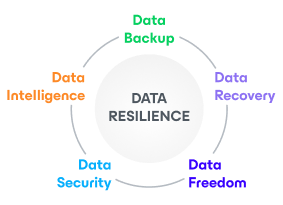In today’s data-driven world, losing Salesforce data can be catastrophic for businesses. Whether due to human error, integration issues, or other data loss scenarios, the risk is significant. That’s why Veeam Backup for Salesforce is essential. It eliminates the risk of losing your Salesforce data and metadata, providing complete control and flexible recovery options. We’re excited to introduce Version 3, packed with new features to take your data protection to the next level.
Key Benefits of Veeam Backup for Salesforce
Run high-frequency backups for low RPO’s: Ensure rapid protection of Salesforce data by backing up as often as every five minutes at no additional cost.
Fast recovery: Restore Salesforce data quickly and see exactly what you are recovering with a transparent restoration process.
Data archiving: Control data sprawl by archiving old or unused Salesforce data to stay within storage limits.
What’s New in V3
Data Archiving
Salesforce storage is limited and costly to expand and many businesses struggle to keep up with growing data demands while staying within existing storage limits. That is why adding Data Archiving is important to efficient organizational management. Data Archiving provides administrators with a streamlined way to manage data growth, ensure compliance, and enhance overall system performance — all without the need to invest in additional high-cost storage solutions. These policies automatically move data from the active production environment to existing backup storage, reducing the load on Salesforce while keeping the complete data structure intact. This process not only helps in controlling storage costs but also ensures that valuable data remains accessible. If archived data needs to be retrieved, it can be seamlessly restored to the live environment in just a few clicks, ensuring minimal disruption and quick access.
Veeam Data Archiving addresses these challenges:
Efficient storage management: Avoid additional storage costs by running data archival policies to move historical and low-touch data from Salesforce to a backup repository.
Cost reduction: Eliminate the management burden and potential financial costs associated with storage limits.
Consistency: Establish routine data archival policies, ensuring consistent data management.
Data Encryption
How does Data Encryption extend the protection provided by the Salesforce Shield Platform?
Enhanced security: Safeguard data during transit to the backup repository by encrypting object fields and file types on the fly.
Mitigate risks: Protect critical data such as financial records, customer data, and intellectual property from breaches and cyber-attacks.
Comprehensive encryption: Fill the gap in Salesforce Shield Platform Encryption by ensuring data remains encrypted as it lands in backup storage, preventing unauthorized access.
What does this mean for the customer?
Like Salesforce Shield Platform Encryption, businesses can now secure their data within backup storage through encryption. Administrators can set up backup policies that encrypt selected fields and files as they are transferred to the backup repository, implementing client-side encryption. This ensures that restore operators cannot access encrypted information within the application, while database and system administrators are also restricted from viewing the encrypted data in the backup repository.
Data Pipeline
Harness the power of your Salesforce data for AI initiatives with our new Data Pipeline feature:
Complete data sets: Present a full Salesforce data set to an data analysis pipeline, crucial for comprehensive data analysis.
Seamless integration: Easily compile original raw data sets, even when archiving to third-party solutions or external storage.
Maximize AI potential: Veeam’s architecture allows you to continue leveraging your Salesforce data for powerful AI insights.
How can Data Pipeline help your initiatives?
Gaining a comprehensive, real-time view of all your Salesforce data, including archived records, for enhanced reporting and AI training. With Veeam Backup for Salesforce, your data archive repository provides a full copy of Salesforce records, along with their historical changes. You can easily configure a read-only version of this database to support your data pipelines and analysis tools, ensuring seamless integration with your reporting and AI workflows.
Archiving data within an data pipeline helps in several ways:
- Optimized storage and performance: By archiving less frequently accessed data, you can keep the active data set lean, reducing the strain on storage resources and improving the performance of the pipeline. This ensures that the AI models work with the most relevant and up-to-date data.
- Cost efficiency: Archiving helps manage storage costs by moving historical or redundant data to a more cost-effective location. This prevents unnecessary expenses related to exceeding storage limits within platforms like Salesforce.
- Data management and compliance: Proper archiving practices ensure that older data is securely stored and easily retrievable when needed, supporting compliance with data retention regulations without cluttering the primary storage.
- Streamlined data processing: With older data archived, the pipeline can focus on processing current data, resulting in faster processing times and more efficient AI model training.
- Scalability: As the volume of data grows, archiving allows businesses to scale their data pipeline without overwhelming the system, ensuring continued innovation and adaptability.
With Veeam Backup for Salesforce Version v3, you gain unparalleled control, flexibility, and security over your Salesforce data. Our latest features — Data Archiving, Data Encryption, and Data Pipeline, empower your business to efficiently manage and protect its data while unlocking new opportunities for AI-driven insights.
Download your free trial today!
